Profile
Lucy Oldham
My CV
-
Education:
Primary school: Haselor School
Secondary school: Alcester Grammar School (selective state school)
Bachelor’s Degree: University of Edinburgh
Master’s Degree: University of Edinburgh/SRUC
PhD (in progress): University of Edinburgh/SRUC
-
Qualifications:
GCSEs: Art & Design, Biology, Chemistry, English Literature, English Language, French, German, History, Mathematics, Music, Physics, Product Design, Religious Education (short course)
A Levels: Biology, Chemistry, Maths (with statistics)
AS Level: French, Critical Thinking
Bachelor of Veterinary Medicine & Surgery
Masters of Applied Animal Behaviour and Animal Welfare -
Work History:
Waitressing (tea rooms)
Bar work
Lambing assistant
Farm technician
Tutoring
Veterinary surgeon (small animal)
Official veterinary surgeon (meat products inspection)
Clinical caseworker (NHS Test and Trace) -
Current Job:
PhD Student (Animal Behaviour and Welfare team, SRUC)
-
About Me:
I am an animal lover, I want to make a difference to farmed animals, but secretly cats are my favourite animal.
-
Read more
I live near Edinburgh with my family, we have a beautiful black and white cat (who is an extra large hunk) and our playful dog who came from Bosnia. I like running, mainly when the sun’s out. I listen to comedy podcasts and when I get chance I love seeing live comedy, going to the cinema, travelling and practising my French. I’m a feminist and go by the pronouns she/her or they/them.
-
Read more
I am studying at SRUC, which is just outside of Penicuik. I have been studying my PhD for just over a year, and most of that was reading and getting ready for my experiments. Moving from the office back to my bedroom due to the pandemic means this is my bookshelf!
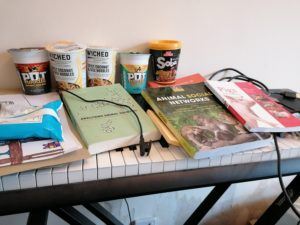
I loved reading all about the different types of behaviour tests that pigs can do, as well as the kind of tricky maths you need to understand the results of experiments. My mathematical friend told me that maths can be used to make anyone feel stupid, and anyone feel clever. I have certainly felt both of these during my PhD.
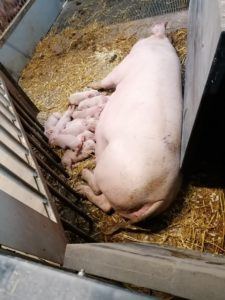
Now I am working with pigs. Piglets and their mothers get to know each-other during the first few days of life. In the wild, piglets would meet their cousins and other pigs at about a week old, but on farms they often don’t meet anyone but their brothers and sisters until it’s time to leave their mum. We’re looking at how this affects their social skills.
Also, some pigs are lucky and have the chance to explore, but some young pigs live in boring, empty pens. We also want to know whether having straw and toys helps them to learn.
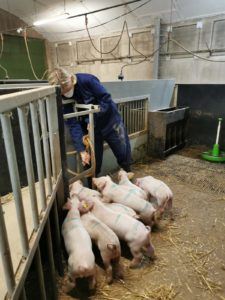
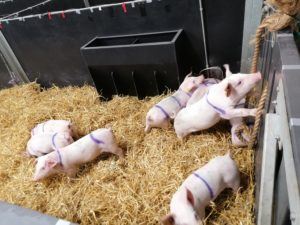
These pigs are given straw bedding, so they can root around like they would outdoors.
So now I’m setting up experiments to measure the cognitive ability of pigs. This means learning about how they learn. It’s a bit like making them sit exams, but because they can’t talk to me or read and write, I have to set up tasks for them to solve. I’m a scientist, but lately I’ve been doing quite a lot of woodwork.
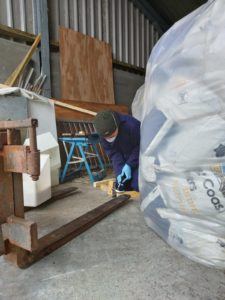
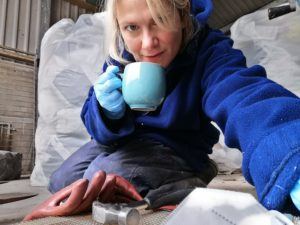
The first one we’re doing (very soon) is a foraging task. Foraging means finding food. We’re going to put banana in some buckets, and not in others, and then test how good the pigs are at finding the rewards. To make sure they don’t just use their excellent sense of smell, we’ve had to design buckets with a secret compartment to contain fruit they can’t reach.
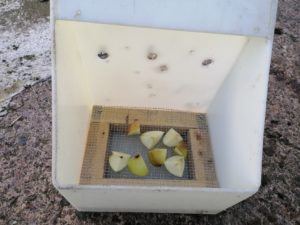
Another test we’re doing, is to see whether the pigs can tell the difference between pigs of different sizes, which are all the same age. Can they tell just by looking and sniffing another pig, whether they are bigger and stronger?
This is important because pigs can fight when they meet a new pig, and they can really hurt each-other. We want to have clever pigs who can tell who’s the boss without having to fight. At the end of the study, we’ll be looking at how they learn who’s their friend and who to stay away from. It’s a long study and I don’t know they answers yet, but I do know that pigs love bananas!
-
My Typical Day:
I have lots of different types of day! At the moment I get up and drive to the pig farm, where it’s time to check on the pigs, feed them and help them learn the difference between their bed and their toilet. I’m also doing what’s called “gentling”, I climb into the pens and move around slowly and stand still so the pigs can sniff me and learn I am not scary.
-
Read more
I start off at 8am with basic jobs- feeding, mucking out and checking the health of the pigs. On the farm
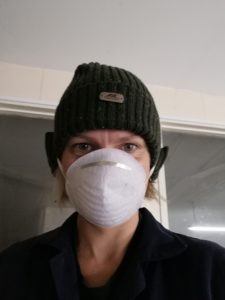 I work alongside other scientists: researchers, technicians and farmers. Understanding how pigs think means getting to know about everything in their lives. When I was moving the adult sows, I learnt that some pigs don’t like to walk towards bright sunshine.
I work alongside other scientists: researchers, technicians and farmers. Understanding how pigs think means getting to know about everything in their lives. When I was moving the adult sows, I learnt that some pigs don’t like to walk towards bright sunshine.I let the pigs have a rest, so at about 9:30am, I’ll check my emails, chat to my colleagues about our plans for the day and make sure I chop some fruit if we’ll need it to train the pigs.
At about 10am, it’s time to get the pigs used to the pens where they will be tested. Just like children starting nursery or school, they have to settle in, so they’re not too scared or distracted to learn.
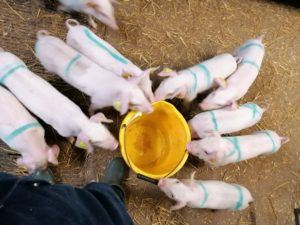
Learning about how pigs learn means understanding their senses and how they see the world. Pigs explore with their snouts, so we always have to make sure we design tests by understanding their super-human smelling power and making tasks they can work by pushing with their noses. We’re learning as much about these little pigs and their personalities as possible during the early weeks, so in the morning we often collect data, such as how long they take to come and explore a person in their pen.
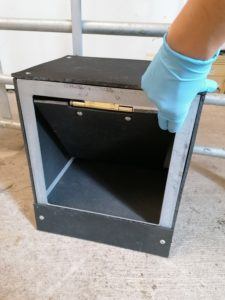
Collecting data with a pen and paper means we then have to type it into a spreadsheet. Collecting data with cameras means we also have to make back-up copies so we can look at it later on.
Lunch for me is most often instant noodles. Sometimes bringing in fruit for the pigs makes me remember to eat fruit too (and it’s always a good day for “Percy Pigs”).
At 1pm it’s time to go back in with the pigs and take them back into the test pen, group by group.
We leave them alone in the early afternoon, because they’re young and still need a lot of sleep. l try and do some reading and writing during this time. I have to work on different sections of my PhD at the same time, which is like a huge essay that you keep writing and editing for years. It’s a lot less scary than it sounds, and I get to read some really interesting studies- I have learnt more about fighting spiders and fish than I thought I would!
At about 4pm, we make sure the pigs have everything they need for the night, then I try to leave the farm around 5:30pm to get back to see my family by 6pm. My 64 pigs are much easier to get ready for bed than my 2 small children, so they keep me busy until about 8pm. Once they are asleep, I’ll try to do a little bit more work, with my cat on the sofa for company. Usually I put my laptop away by 9pm unless there’s something urgent to do for the next day.
I should mention I usually have a shower to wash off the smell of pigs! It lingers though…
-
What I'd do with the prize money:
Let pupils be pigs!
-
My Interview
-
How would you describe yourself in 3 words?
Chatty, jokey, busy
What did you want to be after you left school?
A vet
Were you ever in trouble at school?
Ooh quite a lot in primary school.
Who is your favourite singer or band?
Rilo Kiley
What's your favourite food?
Stir Fry
If you had 3 wishes for yourself what would they be? - be honest!
Be more patient, get a permanent science job (in a warmer country), always be able to run without getting injured.
Tell us a joke.
My nan used to say to me: "Lucy when one door closes, another opens." It's not that she's a particularly optimistic woman, she just lived in a very draughty house.
-
